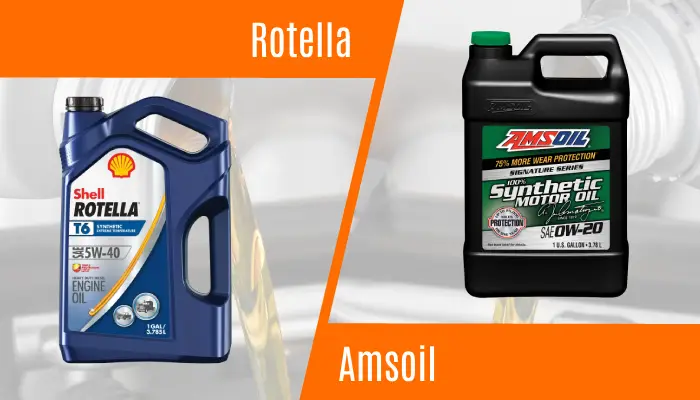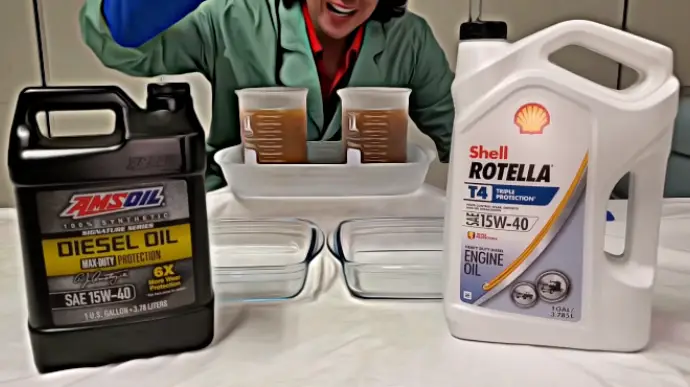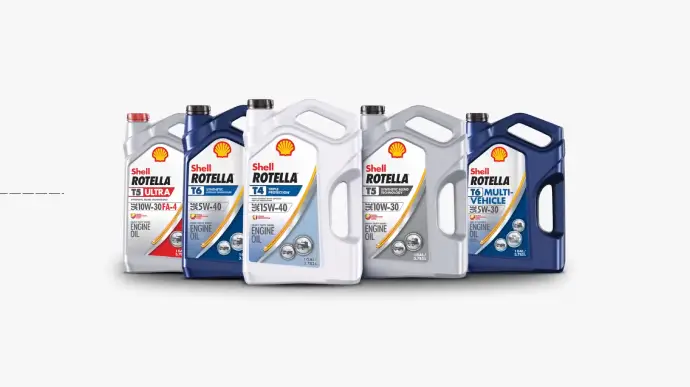Physical Address
304 North Cardinal St.
Dorchester Center, MA 02124
Physical Address
304 North Cardinal St.
Dorchester Center, MA 02124

The choice of motor oil is vital for vehicle owners and enthusiasts, with two prominent contenders in the market being Rotella and Amsoil. Selecting the right motor oil can significantly impact engine performance, longevity, and maintenance costs, depending on your chosen brand.
Amsoil synthetic oil maintains viscosity across various temperatures, ensuring consistent performance in extreme cold and hot conditions. Conversely, Shell Rotella conventional oil may thicken in low temperatures, potentially impacting cold start performance.
Here, we’ll dive into the key difference between Shell Rotella and Amsoil motor oils. We will also cover nitty-gritty details and explain why Rotella is so good and what makes Amsoil oil special.

When comparing Rotella and Amsoil motor oil for your vehicle, several key differences exist.
Shell Rotella motor oil primarily utilizes conventional base oils, such as Group II and Group III. These base oils are derived from crude oil and undergo refining processes to meet industry standards. They also produce synthetic oils.
On the other hand, Amsoil relies on synthetic base oils, particularly Group IV (PAO) and Group V (Ester). These synthetic base oils are engineered to provide exceptional performance and protection in vehicle engines.
Group IV base oils, also known as polyalphaolefins (PAOs), offer excellent temperature stability and resistance to oxidation, ensuring optimal lubrication even under extreme conditions.
Group V base oils, including esters, further enhance the oil’s properties by improving its solvency, detergency, and ability to handle high temperatures.
Another key difference between these two motor oils lies in their viscosity and temperature performance.
Rotella conventional oil may thicken at low temperatures, negatively impacting cold start performance. Conversely, Amsoil synthetic oil maintains its viscosity even in extreme temperatures, providing better cold-start protection and high-temperature stability.
This means that Amsoil performs consistently in a wide range of conditions, ensuring your engine is adequately protected in cold and hot weather.
Shell Rotella is commonly associated with the 15W-40 grade, primarily used in diesel applications. This viscosity grade provides a thicker oil well-suited for heavy-duty and high-temperature environments.
On the other hand, Amsoil offers a wider range of viscosity grades, including options like 5W-40, 0W-40, and 10W-30. These grades are designed to cater to different engine types and operating conditions.
For instance, 5W-40 and 0W-40 grades provide better cold-start protection due to their lower viscosity at low temperatures. In contrast, the 10W-30 grade balances cold-start protection and high-temperature performance.
When comparing the TBN maintenance of Rotella and Amsoil motor oil for your vehicle, there is a significant difference in how well they prevent acid buildup.
Amsoil excels in this aspect, as its TBN remains stable over longer periods, indicating better protection against acid accumulation.
On the other hand, Rotella oils may not provide the same level of TBN maintenance, especially during extended drain intervals. Rotella oils may require frequent changes to prevent acid buildup and maintain optimal engine performance.
Zinc, an important anti-wear additive, protects your engine components from wear and tear.
When comparing Rotella and Amsoil motor oils, it’s important to note that Rotella formulations may have lower zinc content. It could be a concern for older vehicle engines that rely on this additive for added protection.
Alternatively, Amsoil is known for its formulations that contain higher levels of zinc, potentially providing enhanced wear protection. So, if you have an older vehicle or an engine that requires higher levels of zinc, considering Amsoil motor oil might be a wise choice.
If you ride a motorcycle with a wet clutch, you’ll want to know how Rotella and Amsoil motor oils differ in compatibility. Using motor oil that isn’t compatible with wet clutches can lead to clutch slippage, reduced performance, and potential damage to the clutch system.
Rotella T6 is known for its excellent compatibility with wet clutches, ensuring smooth operation and avoiding clutch slippage. This is due to its specific formulation providing the frictional properties required by wet clutches.
Then again, Amsoil’s compatibility with wet clutches can vary depending on the specific formulation of their motor oils. It’s important to check the product specifications to ensure the Amsoil motor oil you choose is compatible with wet clutches.
To maximize the lifespan of your vehicle’s engine, consider the differences in oil change intervals between Rotella and Amsoil motor oil.
Rotella typically requires oil changes every 5000 to 7500 miles due to potential viscosity breakdown and TBN (Total Base Number) reduction over time. This means the oil may become less effective at lubricating and protecting your engine as it ages.
Conversely, Amsoil offers extended drain intervals of up to 25,000 miles. This is because Amsoil demonstrates superior viscosity and TBN retention performance. Its advanced formulation allows it to maintain its protective properties for longer, reducing the need for frequent oil changes.
You can choose between Rotella and Amsoil motor oil based on their specialized applications for your vehicle.
Rotella is designed for heavy-duty vehicles, making it the go-to choice for the trucking and construction industries. Its robust formulation provides exceptional protection and performance under extreme conditions, such as high temperatures and heavy loads.
Meanwhile, Amsoil offers a range of specialized formulations to cater to various applications. If you have a racing vehicle, Amsoil has motor oils specifically engineered to withstand the demands of high performance racing.
Amsoil offers motor oils with enhanced protection against dirt, dust, and other contaminants for off-roading enthusiasts.
Conventional motor oils, such as Shell Rotella, typically have a higher environmental impact due to the extraction and processing of mineral base oils. The extraction process can involve drilling and mining activities that can harm ecosystems and contribute to pollution.
Additionally, the processing of mineral-based oils requires energy and resources, which further contributes to environmental degradation.
On the other hand, Amsoil’s synthetic base oils are often derived from more eco-friendly sources, such as natural gas or vegetable oils. These alternative sources reduce the ecological footprint of the oil production process. Furthermore, Amsoil synthetic oils can be recycled, reducing their environmental impact.
Amsoil is known for its premium synthetic oils, the higher price point reflects the quality of the synthetic base oils and additives. According to your specific needs and budget, Amsoil’s premium synthetic oils may offer additional benefits such as extended oil change intervals and improved fuel efficiency.
Alternatively, Shell Rotella offers a range of motor oils designed to provide excellent engine protection and performance at a more affordable price.

One of the reasons Rotella stands out is its superior wear protection and engine cleanliness compared to other brands.
With Shell Rotella’s advanced formula, you can ensure that your vehicle’s engine stays in optimal condition for longer periods. The oil contains special additives that form a protective film on metal surfaces, reducing friction and minimizing wear.
This is particularly important for fleet managers whose vehicles are subjected to long distances and extreme weather conditions.
Rotella oil is distinguished by its Triple Protection formulation, which has undergone over 40 million miles of on-highway testing.
This extensive testing has proven that Rotella oil can withstand high engine and oil temperatures, ensuring optimal performance even in challenging conditions. Triple Protection is designed to handle the extra soot and acids produced under these conditions, preventing them from damaging your engine.
To improve your vehicle’s fuel economy, consider using AMSOIL motor oil. AMSOIL P.i. is specifically designed to remove stubborn deposits hindering fuel efficiency. By using this motor oil every 4,000 miles (6,400 km), you can experience an improvement in fuel mileage of up to 5.7%.
This is achieved through the advanced formulation of AMSOIL P.i., which effectively cleans fuel injectors, intake valves, and combustion chambers. By removing deposits, the motor oil ensures optimal fuel atomization and combustion, improving fuel economy.
AMSOIL motor oil enhances your vehicle’s performance by optimizing fuel atomization and combustion. The cleaning action of AMSOIL P.i. helps remove carbon buildup and other contaminants that can hinder the fuel system’s efficiency.
The AMSOIL P.i. formula contains concentrated detergent that effectively cleans stubborn deposits from injectors, valves, and the combustion chamber. Doing so restores up to 14% horsepower, resulting in improved overall performance.
In motor oils, the choice between Rotella and Amsoil is far from a simple one-size-fits-all decision. Our exploration of their key differences reveals that these brands cater to different needs and priorities.
With its conventional oils, Shell Rotella appeals to cost-conscious consumers and is often the choice for diesel engine applications. In contrast, with its synthetic formulations, Amsoil offers extended drain intervals, advanced protection, and an environmentally friendly approach.
Ultimately, the selection between Rotella and Amsoil should align with the vehicle’s specific requirements, driving conditions, and individual preferences. Whether a heavy-duty truck or a high-performance sports car, the right motor oil can optimize engine performance and longevity.
Last update on 2026-02-18 / Affiliate links / Images from Amazon Product Advertising API